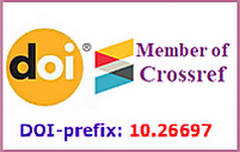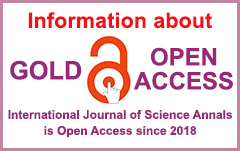| 1 Govt Thiruvarur Medical College, Tamilnadu, India 2 Govt Mohan Kumaramangalam Medical College, Salem Tamilnadu, India |
Background and Aim of Study: Swachh Bharat Abhiyan (SBA) was launched by the Prime Minister of India to accelerate the efforts for achieving universal sanitation. To ensure adequate participation, community must be sensitized about the mission objectives and its role in bringing the desired change.
The aim of the study: to assess the knowledge, perception and practices regarding SBA among rural people, and to study the association between their socio epidemiological factors and awareness regarding SBA.
Material and Methods: Community based cross-sectional study was conducted for duration of 6 months (April to September 2021) at a rural area of south Tamilnadu. A sample of 250 subjects was included and was administered a predesigned, pretested, semi structured questionnaire. The responses were recorded and appropriate statistical tests were applied.
Results: Mean age group of our study participants was 47.6 ± 9.8 years. Television 126 (50.4%) and newspaper 41 (16.4%) were found to be the main source of information about SBA. This study showed out of 250 participants, 142 (56.8%) of them had good knowledge and 174 (69.6%) had good perception score. Our study found a statistical significant association between educational status and level of knowledge and perception score.
Conclusions: The present study found that majority of the subjects were aware of SBA and were having positive attitude and perception but very less practicing in our day today life. Increasing awareness regarding health hazards of open-air defecation and improper disposal of solid waste will create a change in their behavior in adopting healthy lifestyle.
Keywords
knowledge, perception, behavior patterns, practices, environmental sanitation, community
References
Anuradha, R., Dutta, R., Raja, J. D., Lawrence, D., Timsi, J., & Sivaprakasam, P. (2017). Role of community in Swachh Bharat mission. Their knowledge, attitude and practices of sanitary latrine usage in rural areas, Tamil Nadu. Indian Journal of Community Medicine, 42(2), 107-110. https://doi.org/10.4103/0970-0218.205213
Asian Development Research Institute. (2017, July 05). Impact assessment of Swachh Bharat Abhiyan project implemented by Aarogya foundation India in blocks of Jharkhand state [Report]. https://www.ekal.org/pdf/swachh-bharat-abhiyan-project.pdf
Bhattacharya, S. K. (2003). Progress in the prevention and control of diarrhoeal diseases since Independence. The National Medical Journal of India, 16(2), 15-19. https://pubmed.ncbi.nlm.nih.gov/12816201/
Chaudhary, A. (2017). Swachh Bharat mission – Need, objective and impact. International Journal for Research in Management and Pharmacy, 6(2), 24-28. https://www.raijmr.com/ijrmp/wp-content/uploads/2017/11/IJRMP_2017_vol06_issue_01_02.pdf
Ganesh, K. S, Sitanshu, K. S, & Animesh, J. (2011) Health and environmental sanitation in India: Issues for prioritizing control strategies. Indian Journal of Occupational and Environmental Medicine, 15(3), 93-96. https://doi.org/10.4103/0019-5278.93196
Geeta, J., & Kumar, S. S. (2014). Open defecation: Awareness and practices of rural districts of Tamil Nadu, India. International Journal of Scientific Research, 3(5), 537-539. https://www.worldwidejournals.com/international-journal-of-scientific-research-(IJSR)/fileview.php?val=May_2014_1493041297__176.pdf
Gopal, S., Sarkar, R., Banda, K., Govindarajan, J., Harijan, B. B., Jeyakumar, M. B., Mitta, P., Sadanala, M. E., Selwyn, T., Suresh, C. R., Thomas, V. A., Devadason, P., Kumar, R., Selvapandian, D., Kang, G., & Balraj, V. (2009). Study of water supply & sanitation practices in India using geographic information systems: some design & other considerations in a village setting. The Indian Journal of Medical Research, 129(3), 233–241. https://pubmed.ncbi.nlm.nih.gov/19491414/
Jeratagi, S., Kumar, Y., & Mallapur, M. D. (2017). Awareness about sanitary toilets in a rural area of north Karnataka, India: A cross sectional study. International Journal of Community Medicine and Public Health, 4(2), 363-369. https://doi.org/10.18203/2394-6040.ijcmph20170256
Kishore, Y. J., Naidu, N. K., Sreeharshika, D., Harikrishna, B., & Malhotra, V. (2018). Study to assess knowledge, perception and practices regarding Swachh Bharat Abhiyan among rural people of Nalgonda district in Telangana state. International Journal of Community Medicine and Public Health, 5(8), 3399-3405. https://doi.org/10.18203/2394-6040.ijcmph20183069
Kuberan, A., Singh, A. K., Kasav, J. B., Prasad, S., Surapaneni, K. M., Upadhyay, V., & Joshi, A. (2015). Water and sanitation hygiene knowledge, attitude, and practices among household members living in rural setting of India. Journal of Natural Science, Biology, and Medicine, 6(Suppl. 1), S69–S74. https://doi.org/10.4103/0976-9668.166090
Melnyk, Yu. B. (2020). International view at health: World after pandemic COVID-19. International Journal of Science Annals, 3(2), 24-32. https://doi.org/10.26697/ijsa.2020.2.4
Ministry of Jal Shakti. (2017). About Swachh Bharat Mission. Department of Drinking Water and Sanitation. https://swachhbharatmission.gov.in/sbmcms/index.htm
Nath, K. J. (2003). Home hygiene and environmental sanitation: A country situation analysis for India. International Journal of Environmental Health and Research, 13(Suppl. 1), S19-S28. https://doi.org/10.1080/0960312031000102778
Pandve, H. T. (2008). Environmental sanitation: An ignored issue in India. Indian Journal of Occupational and Environmental Medicine, 12(1), 40. https://doi.org/10.4103/0019-5278.40816
Pradhan, P. (2017). Swachh Bharat Abhiyan and the Indian Media. Journal of Content, Community & Communication, 5, 43‑51. https://www.amity.edu/gwalior/jccc/pdf/jcc-journal-june-2017-06092017-50-58.pdf
Pruss-Ustun, A., Bos, R., Gore, F., & Bartram, J. (2008). Safer water, better health: Costs, benefits and sustainability of interventions to protect and promote health. World Health Organization. https://apps.who.int/iris/handle/10665/43840
Singh, M. (2008, November 18). PM’s speech at the third South Asian Conference on sanitation. Archive PMO. https://archivepmo.nic.in/drmanmohansingh/speech-details.php?nodeid=729
Swain, P., & Pathela, S. (2016). Status of sanitation and hygiene practices in the context of “Swachh Bharat Abhiyan” in two districts of India. International Journal of Community Medicine and Public Health, 3(11), 3140‑3146. https://doi.org/10.18203/2394-6040.ijcmph20163925
Usha, T., Ramandeep, Sachdev, A., Gupta, A. (2020). Knowledge, perception and practice about solid and liquid waste disposalin Shimla city of Himachal Pradesh. Himalayan Journal of Community Medicine and Public Health, 1(2), 34-38. https://www.himjournals.com/articles/68_Knowledge_Perception_and_Practice_about_Solid_and_Liquid_Waste_Disposalin_Shimla_City_of_Himachal_Pradesh
World Health Organization, & United Nations Children’s Fund (UNICEF). (2014). Progress on sanitation and drinking water: 2014 update. World Health Organization. https://apps.who.int/iris/handle/10665/112727
World Health Organization, & United Nations Children’s Fund (UNICEF). (2017). Progress on drinking water, sanitation and hygiene: 2017 update and SDG baselines. World Health Organization. https://apps.who.int/iris/handle/10665/258617
Yoada, R. M., Chirawurah, D., & Adongo, P. B. (2014). Domestic waste disposal practice and perceptions of private sector waste management in urban Accra. BMC Public Health, 14, 697. https://doi.org/10.1186/1471-2458-14-697
Madhankumar Velu (Corresponding Author) – https://orcid.org/0000-0002-3453-126X;
Udhayabashkaran Kadirvelu – https://orcid.org/0000-0002-8339-7634; MD Community Medicine, Assistant Professor, Department of Community Medicine, Govt Mohan Kumaramangalam Medical College, Salem Tamilnadu, India.
Arularasan Samraj – https://orcid.org/0000-0002-8700-851X; Assistant Professor, Department of Orthopaedics, Govt Thiruvarur Medical College, Tamilnadu, India.
Kayalvizhi Palanichamy – https://orcid.org/0000-0002-7540-3926; Govt Thiruvarur Medical College, Tamilnadu, India.
| |
APA
Madhankumar, V., Udhayabashkaran, K., Arularasan, S., & Kayalvizhli, P. (2022). Impact of knowledge and perception of the Swachh Bharat Abhiyan on the health behavior patterns of rural residents in India. International Journal of Science Annals, 5(1-2), 9–18. https://doi.org/10.26697/ijsa.2022.1-2.2
Harvard
Madhankumar, V., Udhayabashkaran, K., Arularasan, S., & Kayalvizhli, P. 2022. "Impact of knowledge and perception of the Swachh Bharat Abhiyan on the health behavior patterns of rural residents in India". International Journal of Science Annals, [online] 5(1-2), pp. 9–18. viewed 25 December 2022, https://culturehealth.org/ijsa_archive/ijsa.2022.1-2.2.pdfVancouver
Madhankumar V., Udhayabashkaran K., Arularasan S., & Kayalvizhli P. Impact of knowledge and perception of the Swachh Bharat Abhiyan on the health behavior patterns of rural residents in India. International Journal of Science Annals [Internet]. 2022 [cited 25 December 2022]; 5(1-2): 9–18. Available from: https://culturehealth.org/ijsa_archive/ijsa.2022.1-2.2.pdf https://doi.org/10.26697/ijsa.2022.1-2.2












